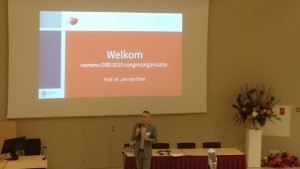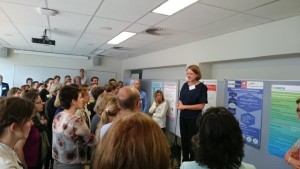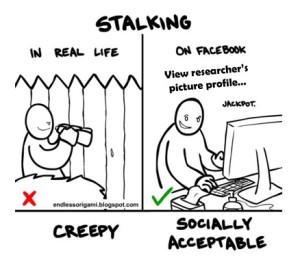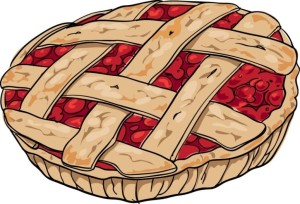 Usually we upload a new post every two weeks. However, last week the yearly ORD (Dutch Educational Research Days), a three-day conference, took place and we thought this conference deserved an extra post. Every PhD-student will go to at least one conference and you might therefore either recognize some situations depicted below, or use some of the experiences when preparing to go to a conference.
Usually we upload a new post every two weeks. However, last week the yearly ORD (Dutch Educational Research Days), a three-day conference, took place and we thought this conference deserved an extra post. Every PhD-student will go to at least one conference and you might therefore either recognize some situations depicted below, or use some of the experiences when preparing to go to a conference.
In this blogpost Tessa and I will give your our experiences from the ORD2015. Tessa, as a non-presenter who visited the ORD for the first time. Me, as a presenter of my first paper and who has visited the ORD now for the second time.
Saskia
The ORD this year, took place in Leiden. We started Wednesday June 17th with a PhD pre-conference organized by VPO with workshops and a nice lunch. I took a workshop ‘academic writing’ by Antoine van den Beemt. It was great to hear how Antoine compared writing to an interface, and that both should be easy-to-use.
After lunch, the conference started with the first parallel sessions. During these sessions the symposium in which I was to present my paper took place. I had spent quite some time on making a good PowerPoint presentation and also thought about a talk to go with it. Of course I was a bit nervous. Not about how I would do it, but more about what people would think of my study; about the way I conceptualized my research question, the method I used, etc. Luckily, it appeared I had no need to worry. I got really good questions and some remarks from the audience and also good feedback from the discussant of the symposium! 🙂
Directly after my own presentation the conference was officially opened by handing out awards and with a keynote lecture by Marilyn Cochran Smith. She took us through the past, the present and the future of research questions central in teacher preparation research. Very interesting to see this all next to each other!
Having my presentation done so soon during the conference, I could happily go about the rest of the conference, making new contacts and of course spending time with people I had met already on other occasions. The first moment I could spend on this were the drinks organized after the official opening. I got together with people I already knew from courses and another conference. It was great seeing and talking to them again. Because, as I see it, a conference can be very good to make new contacts, share experiences and ideas, but these last two can also be done with people you already know. And, I think a bit of fun is also important to keep the spirits up throughout the whole conference.
Thursday started again with a keynote. There were two of them, but I attended the one of Bas Haring, who dared to say what probably many people think: ‘Try out new methods when the familiar ones don’t seem to suffice. Don’t be afraid of what people might  think.’ Then, a full day of attending parallel sessions with paper presentations, symposia and posters followed. I can honestly say I learned a lot from them. Of course, there were also some new contacts made. For example, it was great to see how other people from Belgium got similar results as I found in my interviews; certainly I should do something with that (and I did ;-))!
think.’ Then, a full day of attending parallel sessions with paper presentations, symposia and posters followed. I can honestly say I learned a lot from them. Of course, there were also some new contacts made. For example, it was great to see how other people from Belgium got similar results as I found in my interviews; certainly I should do something with that (and I did ;-))!
After this full day a dinner and a party followed, which I could not attend unfortunately, but word has it, it was a great party!
Friday was the last day: again two more keynotes and two parallel sessions were scheduled (interrupted by lunch). More new insights were gained this day and again, new contacts were made. The whole conference was concluded by after-conference drinks and then everybody went home.
I can honestly say that, although I managed to summarize this whole conference in a little over 500 words, it was, just like last year and probably every following conference will be, a very interesting conference, full of experiences, new people, fun, learning and also, as turned out Friday evening, very tiring (I didn’t see the end of the movie we started watching at home)… Thank you VPO for organizing a great pre-conference and also a big thank you to the organization, ICLON, Faculty of Social Sciences and LUMC, of the University Leiden.
Tessa
ORD 2015 was the first multiple-day-conference I attended since I began to work as a PhD 7 months ago. As a PhD, you are usually very much in charge of your own day-planning (which in my case often exists of a combination of research related activities, reading, school visits and office meetings). Making your own day-planning can be quite hard sometimes, because it requires structure and discipline. I usually manage though. But, sometimes, I miss the good old days at college where you could just sit down, follow a lecture and absorb the information instead of having to sort it all out yourself. This is exactly why I find conferences so relaxing and intense at the same time. Relaxing, because I could just absorb information other researchers were so generous in sharing, and intense because of the diversity and the amount of information. It is safe to say that I have really enjoyed myself, and I have attended so much interesting sessions!
Of course, a conference is also a good opportunity to broaden your academic network. This is sometimes easier than you think: you sit down at lun ch next to someone you don’t know, introduce yourself, start talking about your research topics and voilà: a potential new academic contact has been made. However, I know a lot of people also struggle with the whole networking-thing – I struggled with it myself at first too. Let me tell you about one of my very first academic gatherings. I went someplace where I was sure I would know absolutely no-one. I also wanted to network for my research. So, a few days before the gathering, I looked up people on the attendance list and made notes about who I wanted to meet, and even included pictures so I knew which persons to approach – after all, I had never seen or met them before. Especially printing out the pictures made me feel a bit like a stalker, but it turned out to be a very convenient way to network: with focus. I can recommend this to everyone: look up at least 2/3 persons you want to meet and make sure you meet them. Find someone who can introduce you to them, or go up there yourself.
ch next to someone you don’t know, introduce yourself, start talking about your research topics and voilà: a potential new academic contact has been made. However, I know a lot of people also struggle with the whole networking-thing – I struggled with it myself at first too. Let me tell you about one of my very first academic gatherings. I went someplace where I was sure I would know absolutely no-one. I also wanted to network for my research. So, a few days before the gathering, I looked up people on the attendance list and made notes about who I wanted to meet, and even included pictures so I knew which persons to approach – after all, I had never seen or met them before. Especially printing out the pictures made me feel a bit like a stalker, but it turned out to be a very convenient way to network: with focus. I can recommend this to everyone: look up at least 2/3 persons you want to meet and make sure you meet them. Find someone who can introduce you to them, or go up there yourself.
As I wrote before, I love absorbing information. I would also like to share some of the things I have learned during this conference below:
- Antoine van den Beemt, on how to structure your text as an interface: Before writing a text, define your GTDP:
- Goal (aim or purpose) – this goal must be consistent through the whole text!
- Target group – what journal are you writing for?
- Domain – what is the main, general topic of your text?
- Preconditions – both technical (eg. # of words, language) as organizational (planning, which co-author writes what?)
You can use this mnemonic to remember: Go Try Delicious Pie. And then reward yourself by doing so 😉
- Marilyn Cochran Smith, on common research questions through educational research history:
- 1950-1960: The attributes question – perceptions on what makes a good teacher
- 1960-1980: The effectiveness question – process-product oriented research.
- 1980-1990:The knowledge question – on the teacher knowledge base.
- Present: The learning question & The policy question
- Arthur Bakker on pupils attitudes towards science: their meta-analysis showed that innovative approaches to science education (such as inquiry-based learning) do not have a negative impact on pupils’ attitude towards science.
- Els Consuegra on gender differences in education: boys and girls appear to talk just as much during class, but boys often get more negative feedback on this disruptive talking.
- I also learned my colleagues are pretty good dancers, as was revealed at the VPO party Thursday night 😉 (imagery available in last videoclip)
Of course, there were many, many more things to be learned during the conference, but if you are curious, I would say: come to the next ORD! I look forward to meeting you (and I promise, I won’t print out your picture – this time ;-)).






